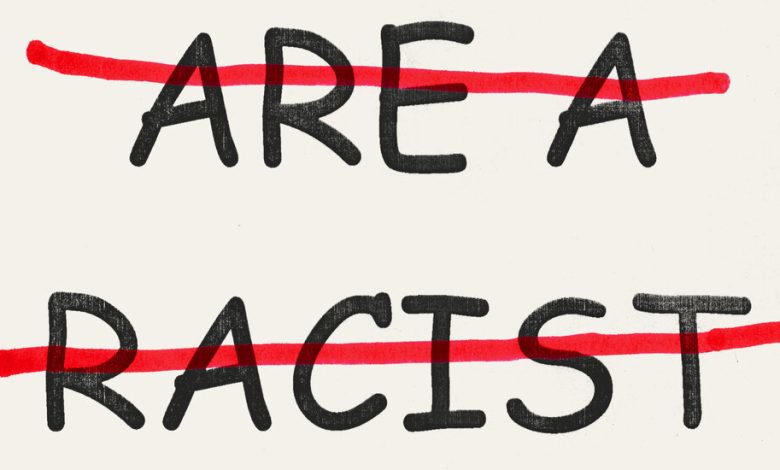Trying to Prove You’re Not a Racist

Since I started writing this newsletter, once about every couple of weeks I have received a missive from someone troubled by a controversy involving race, usually in the workplace.
These readers feel that their opponents in these fusses are unfairly tarring them as racist. Typical disputes they find themselves embroiled in include whether a school program should devote itself centrally to antiracism, whether it is fair to hire people ranking skin color over qualifications, whether reparations for slavery in a local context are appropriate and what they should consist of, and whether a piece of art should be deemed racist.
They seek my confirmation that they are in the right, that they are not racist, and presumably want to take that judgment back to the ring as proof that their position is not anti-Black. Sometimes they are under the impression that it would help if I addressed their colleagues over Zoom.
It has occurred to me that I should provide, in this space, an all-purpose response to this kind of letter I get. For starters, I’d like to offer a guide to my positions on the debates my correspondents seem to find themselves in.
To wit:
I do not support treating the word “Negro,” as opposed to the “N-word,” as a slur. “Negro” was not a slur when it was current, and the case for classifying it as one now because it is archaic is quite thin. Why look for something to be offended by?
I do not support calling something “racist” because outcomes for it differ for the (Black) race. For example, I take issue with the idea that there is something “racist” or “biased” about the questions on the SAT.
I do not condemn white authors writing Black fictional characters who speak Black English so long as it’s a respectful and realistic rendition.
I think the idea that it is cultural appropriation when whites take on Black cultural traits is ahistoric — human groups sharing space have always shared culture — and also pointless, given that Black American culture has always, and will continue to, infuse mainstream America. I also do not think arguments about power relations somehow invalidate my position. I think that it is in vain to decree that culture cannot be borrowed by people in power from those who are not.
I think the idea that only Black people should depict Black people in art and fiction is less antiracist than anti-human, in forbidding the empathy and even admiration that can motivate respectful attempts to create a literary character.
I revile any concept of equity that allows for appointing Black people to positions over more highly qualified non-Black ones.
I know that racism exists both on the personal and structural levels. But I also feel deep disappointment that the tenor of our times seems to encourage some Black people to exaggerate racism’s effects, to enshrine a kind of charismatic defeatism as a substitute for activism. And then there are those who outright fabricate having suffered racist mistreatment. I also worry that these kinds of things desensitize many observers from acknowledging the real racism that exists.
I think reparations are important — and happened already, decades ago with the Great Society, affirmative action, the expansion of welfare benefits in the late 1960s and the Community Reinvestment Act of 1977, which encouraged banks to extend credit in low-income neighborhoods. I would not stand implacably opposed to new reparations today in the form of various kinds or even cash payments but am highly skeptical that a critical mass of Black commentators would accept them as true compensation. I can’t help thinking the race debate would stay where it is now.
I condemn notions that there are white ways of thinking (such as being precise and stressing individualism) and Black ones (such as being intuitive and stressing the communal), such that Black people resisting “assimilation” is taken as a kind of higher wisdom. That vision of Blackness would birth no useful inventions, yield only the occasional out-of-the-box insight and is alarmingly close to tacky, Dionysian depictions of Blackness, such as those in Norman Mailer’s “The White Negro.”
I consider it anti-intellectual performance art to retool educational institutions as antiracist academies that “center” the discussion of discrimination and other abuses of power in the instruction of all subjects.
Now that I’ve laid out a primer on my opinions, people who write me seeking support should keep in mind that quite a few Black people consider my stances on race to be a revolting kind of heresy.
Rather, as I have learned in my now lengthy experience with this kind of criticism, it’s that those who disagree with me feel — or perhaps have been taught to feel — that opinions like mine amount to giving white people a pass on racism, that they distract whites from engaging in the kind of thinking and activity that will help Black America. As such, they do not think of people like me as having opinions different from theirs but legitimate. They think opinions like mine are dangerous. I can imagine that to my critics, white people writing me for counsel is exactly what Black America doesn’t need. I am basing this on 25 years of receiving this kind of critique from various directions.
To witness a demonstration of the vigor and tone of this sentiment, please see the negative reactions that are sure to be part of the social media response to this newsletter — from people of all races. No Zoom talk could even begin to cut through such heated resistance.
Be under no illusion, then, that telling your colleagues my opinion about a race issue will be received by them as emanating from some kind of guru. You may suppose that it will be effective to say, “See? There are Black people who feel the way I do.” But to some of your opponents, those Black people may be seen as not just a different kind, but a wrong kind.
If people who don’t see race things my way continue to call you names and get in your way, you have my full sympathy. (And an overprivileged college professor like me isn’t the only one who would come to your defense. “Unwoke” views on race are quite common among Black people of all levels of education.)
But I consider myself engaged in a gradual process of — I hope — shaping our general consciousness on race via constant argument over decades of time. This is a long-game business. Views change slowly, incrementally, and writing is part of making it happen.
If you choose to present my take on race issues amid tense occasions anyway, you should understand that the issue is less my opinion than what you intend to do amid the response to it. My dear correspondents: Please know that it will require a degree of intestinal fortitude to withstand your opponents’ calling you a racist for agreeing with me. Know also, though, that if you’re up for that, you are joining me in that work I am committed to.
Have feedback? Send a note to [email protected].
John McWhorter (@JohnHMcWhorter) is an associate professor of linguistics at Columbia University. He hosts the podcast “Lexicon Valley” and is the author, most recently, of “Woke Racism: How a New Religion Has Betrayed Black America.”





